A doshala given to Sir Syed Ahmad Khan by the British government was
donated to Aligarh Muslim University on behalf of the late Mrs. Atiya
Masud. The doshala was presented to Dr. Mahmood-ur-Rahman, Vice
Chancellor, during the December 1998 ceremony commemorating Sir Syed's
Centenary. Sir Syed, were he alive today, would have been proud of the
woman who came to inherit his doshala, and perhaps some of his spirit.
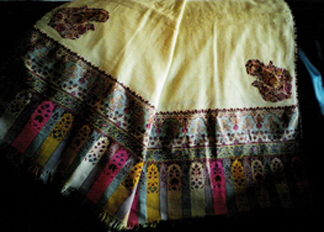
Atiya Masud, nee Atiya Fatima, was the oldest daughter of Mirza
Mohammad Said and Zahra Mohammedi Begum - the granddaughter of Syed
Hamid, the elder son of Sir Syed Ahmad Khan.
Her father, a professor of English at Government College, Lahore, was a
student of the great philosopher-poet Allama Mohammad Iqbal, and later
his colleague and friend.
Like Sir Syed, Atiya's parents placed great emphasis on education.
She attended Isabella
Thoburn College, Lucknow, and Inderprastha College, Delhi. She was a
woman of many accomplishments, including an educator, but she was first and
foremost a wife and mother.
Atiya married Mirza Nasiruddin Masud,
vice-captain, and center-half of the legendary India hockey team which
won the gold medal at the 1936 World Olympics in Berlin. The newly
married couple moved to Rampur State where Masud became Chief Secretary.
Colonel B. H. Zaidi, who later became a Vice-Chancellor of AMU, was then
Chief Minister. It was in Rampur that Atiya began taking on activities
outside the home, this at a time when most Indian Muslim women observed
"purdah."
I remember the Montessori school I attended in Rampur, and the girls
college next door. Much later I learned that mother was a founder of
that Montessori school, and it was she who persuaded the Nawab to allow
a little used palace to be converted to a girls college of which she
became the head mistress, a job she undertook without pay. And it was in
Rampur that I played with a toy train complete with engine, and cars
with seats and bunk beds. It did not strike me as unusual that the train
was built by my mother who also found time to knit sweaters for me and
my sister Raziya, and to run the house.
In 1947 I was sent to Woodstock, Mussoorie, an American boarding
school in the Himalayas. I returned to my grandparents home in Delhi
amidst the cataclysmic partition
of India. Many years later I learned that our parents had been visiting
father's parents in New Delhi, and of their escape from a mob
threatening to kill everyone inside. They fled to the home of mother's
parents on Sir Syed Ahmad Road - one of four houses at this location
belonging to Sir Syed's grandchildren.
During the rioting that followed partition Salman, the youngest son
was born, father began working with Mahatma Gandhi, and became the
private secretary to the Minister for Education, Maulana Abul Kalam
Azad, a close friend of Mirza Mohammad Said - mother's father. By then
virtually all our relatives had fled to Pakistan. We moved to New Delhi
where mother opened a Montessori school at home. A few years later she
met Mr. Albert Joosten who had been raised by Dr. Maria Montessori,
and with him conducted training courses for Montessori teachers. During a
training course in Calcutta she met Mother Teresa, and worked with her
for several months.
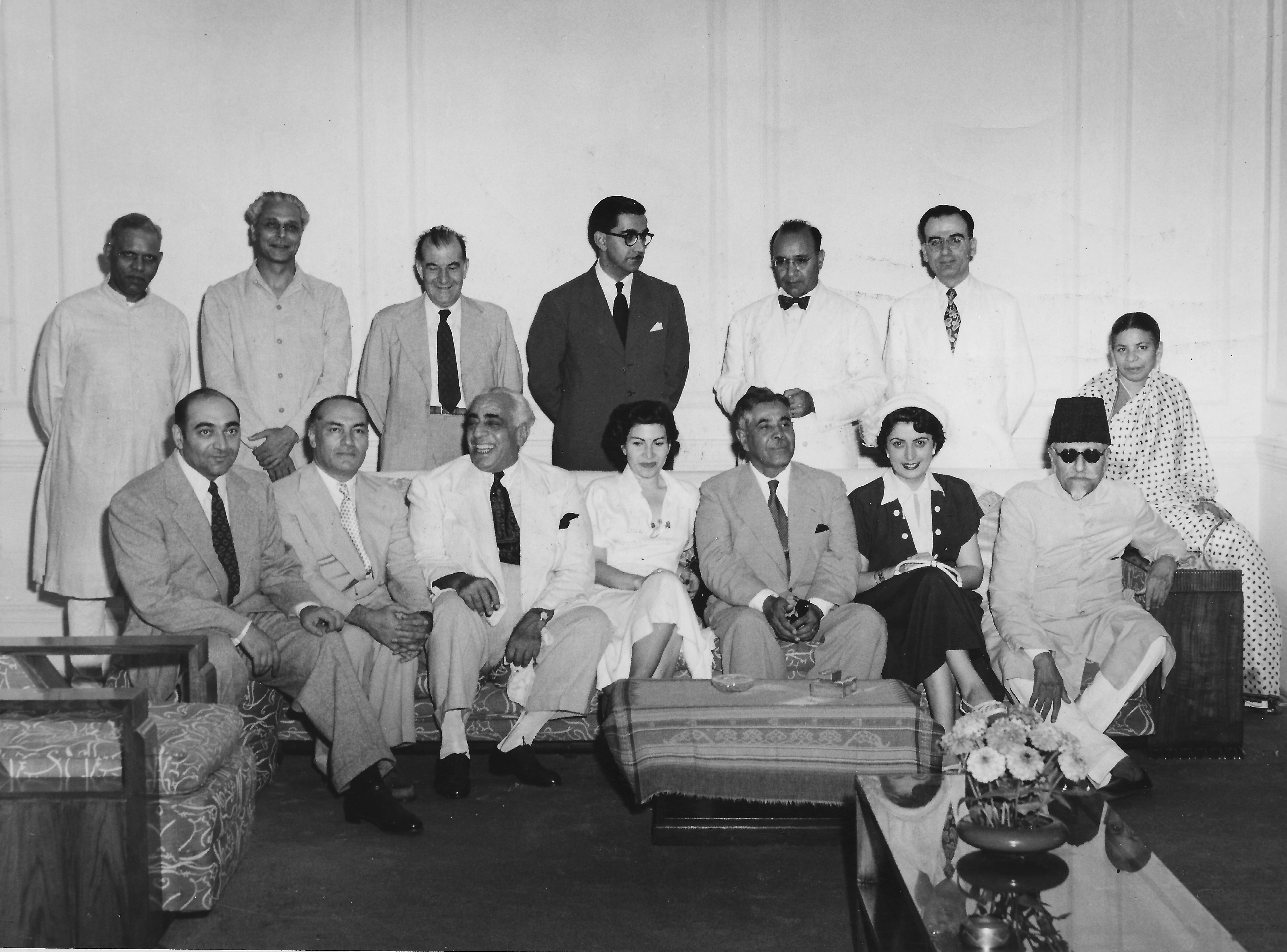 Atiya behind Maulana Azad, Masud back row 2nd from left
Atiya behind Maulana Azad, Masud back row 2nd from left
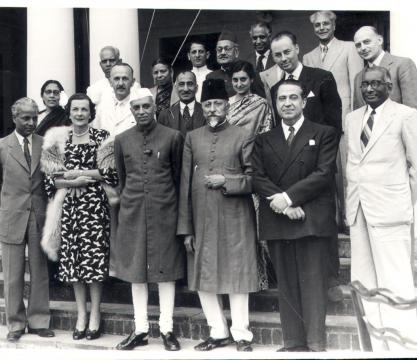 Lady Mountbatten on Nehru's right, Atiya behind Nehru, Masud at top
Lady Mountbatten on Nehru's right, Atiya behind Nehru, Masud at top
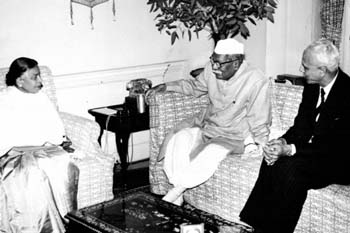 Atiya and Masud with President Rajendra Prasad
Atiya and Masud with President Rajendra Prasad
Mother lived in two worlds. I recall trips into Old Delhi where she
observed "purdah," and the New Delhi where she lived, worked
in refugee camps, and served as the hostess at dinners in the home of
Maulana Azad, and later in the foreign missions with our father where
she organized state dinners, community events, and played bridge, chess
and tennis. Throughout her busy life she attended to her children, the
children's friends, and to the relatives who stayed with us for months
at a time - while keeping up a steady correspondence with the new
friends she made on her travels. However, the family always came first,
and hardly a day went by that we didn't have meals together.
Father became the first Asian to head a UNESCO mission (Indonesia),
Consul General to Muscat and Oman, and Ambassador to Saudi Arabia. Syed
Shehabuddin, a leading Muslim politician, was then First Secretary in
the Indian embassy.
In Saudi Arabia mother came to know Queen Iffat, and advised her on
the education of her children. Before she left Saudi Arabia, she met
with King Faisal in his palace - an unprecedented event arranged by the
Queen.
I attended St. Stephens College, and in 1960 the University of
Oklahoma in the United States. Several years later, first Salman, and
then Raziya came to the U.S. Father retired, mother worked in Indira
Gandhi's election campaign, and took me to visit Mrs. Gandhi during one
of my trips to India, and although both parents often visited the U.S.,
I lost touch with India. But marriage and fate rekindled my interest in
India, and my ancestors.
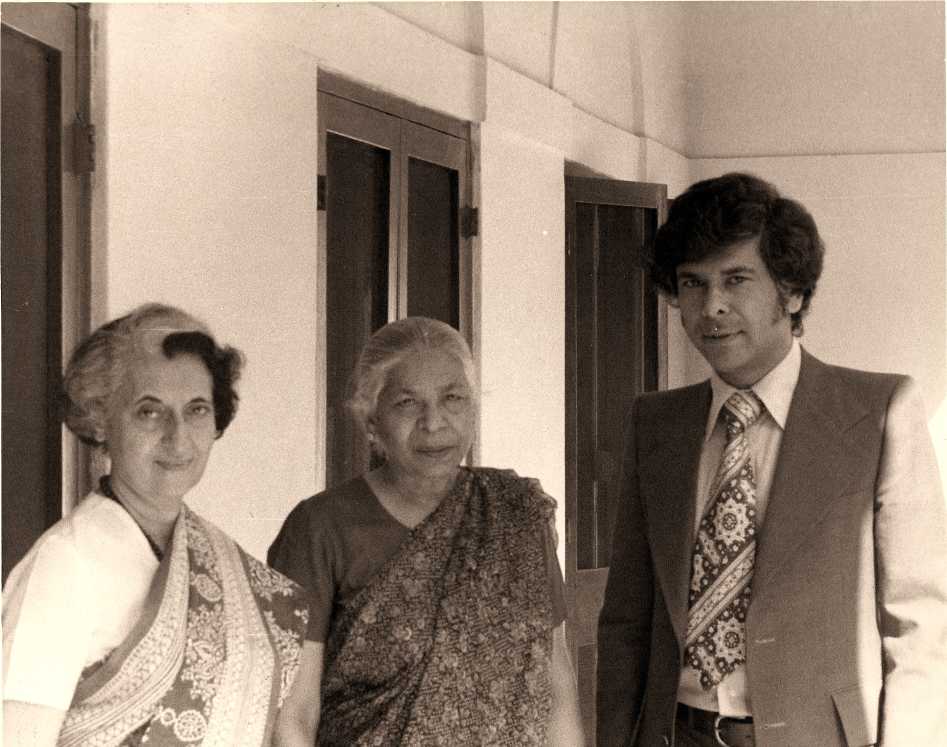
In 1972 I married Neelam Misal, daughter of the co-founder of
Himalaya
Drug Company, and a graduate of AMU. Although Sir Syed was
mentioned at that time, I retained only a vague idea of my relationship
to him. I moved to Washington, D.C. in 1975 where I came across the book
"Aligarh's First Generation." I wondered why an American
student would do a doctoral dissertation on Sir Syed. Mother told me she
had assisted the author in his research for the book. Then in 1987,
while on assignment for USAID in Pakistan, I saw a sign on vacant
property next to the USAID building identifying it as the location for a
memorial to Sir Syed. And it was on my second USAID assignment to
Pakistan in 1991 when I came across an article in The Nation that led me
to the realization that Sir Syed's contribution to the Muslims of India
extended far beyond the boundaries of the great university he founded.
1991 was the year of another convulsion - the Gulf War. I had quit my
USAID assignment, gone to India, and had been listening, albeit not with
great enthusiasm, to my father on Islam, the condition of Muslims, and
of Indian politics. I had also thought of tracing my ancestry, and was
taking notes from my mother when she asked if I wanted to see Sir Syed's
doshala. She pointed out the single thread embroidery which she had been
told was no longer done, and where the center piece, which had been
replaced, joined the original, embroidered borders of the doshala. She
described our family tree, and related stories about our ancestors while
I took notes.
I also learned that she had inherited Sir Syed's seal, but it had been lost
along with father's Olympic gold medal.
Little did I know that the Gulf War, and this visit home, would lead me in
a new direction. I began writing about U.S. foreign policy, and the unjust
treatment of Muslims, for the Eastern Times, and eventually on the Internet
through The Wisdom Fund.
Father passed away shortly after the 1991 visit, and mother, with
great reluctance, came to live in the U.S. Mother, who had been carried
in palanquins before the partition of India, had long been travelling in
jet airplanes. She maintained her enthusiasm for reading and learning,
and stayed abreast of world affairs. From her I came to learn more about
our ancestors, and Sir Syed.
Mother passed away in 1997. We buried her next to father in a
cemetery at Nizamuddin, New Delhi. The Sir Syed family tree she described was checked by other
family members, and placed on the Internet. Now I wish I had listened
more carefully to the stories mother used to tell, and participated more
fully in those discussions with father with his vast knowlege of world
history and diplomacy.
My writing led eventually to my meeting with the U.S. based American
Federation of Muslims from India, and to my visiting AMU in December
1998 to commemorate the centenary of Sir Syed's demise. Here I had the
privelege and honor to donate Sir Syed's doshala to the university where
it rightly belongs.
[Presented by Mr. Enver Masud to Aligarh Muslim University in India,
December 12, 1998, during the innaugural session of the conference
commemorating Sir Syed's death. Mr. Masud is founder and president of
The Wisdom Fund.]
---
More from the M. N. Masud family photo albums